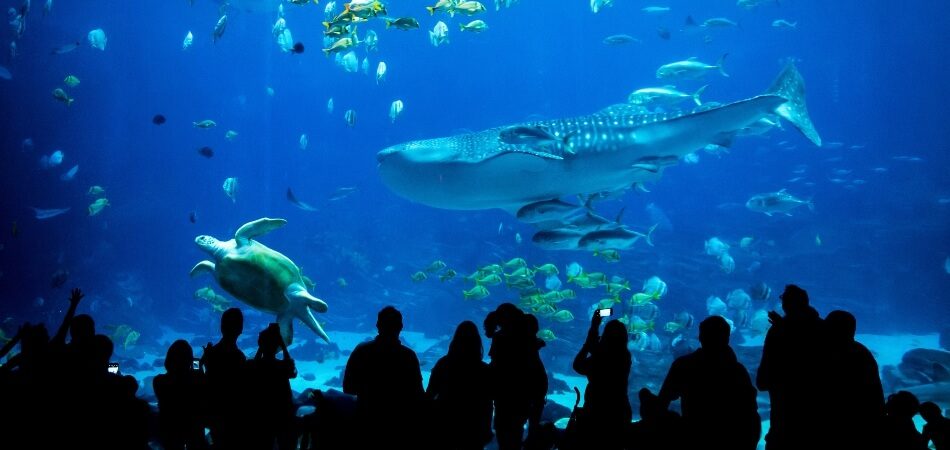Fisheries conferences, like hidden treasure chests of knowledge and opportunity, beckon to those in the aquatic industry. These gatherings of like-minded professionals and experts hold the power to transform your understanding of the field and propel your career to new heights.
So, why should you attend a Fisheries Conference?
Attending a Fisheries Conference offers invaluable opportunities for networking, staying updated on industry trends, and gaining insights from experts. It’s a chance to exchange ideas, enhance your knowledge, and contribute to the sustainable management of aquatic resources.
In this blog, we’ll explore why you shouldn’t miss these gatherings. Get ready to discover a world of opportunities and insights that will change how you see fisheries. Learn how networking, staying updated, and gaining expert knowledge at Fisheries Conferences can benefit your career and contribute to sustainable fisheries management.
What is a Fisheries Conference?
The International Fisheries Conference serves as a crucial hub for professionals and enthusiasts within the aquatic industry. These gatherings facilitate knowledge exchange, discussions on emerging trends, and collaborations aimed at enhancing fisheries management practices. Participants, ranging from scientists to policymakers, converge to share their expertise and insights.

These conferences typically feature diverse sessions and workshops addressing various facets of fisheries, such as sustainable harvesting techniques, conservation strategies, and technological advancements. Experts present their research findings, allowing attendees to stay updated on the latest developments and challenges in the field. Networking opportunities abound, enabling individuals to forge valuable connections and partnerships.
Moreover, Fisheries Conferences play a pivotal role in advancing the broader goal of preserving aquatic resources. They serve as platforms for deliberating on conservation measures, policy reforms, and sustainable practices. Overall, these events are instrumental in fostering a collective effort toward responsible fisheries management and the long-term well-being of our aquatic ecosystems.
Different Types of Fisheries Conferences
Fisheries conferences are vital platforms where professionals and enthusiasts gather to exchange knowledge and insights. These conferences come in various forms, each tailored to specific aspects of the industry:
International Fisheries Conferences
Attracting experts worldwide, these conferences provide a comprehensive view of international fisheries management, policy discussions, and global efforts to address overfishing and sustainability. Conference attendees gain insight into how different countries collaborate on fisheries conservation and how international treaties and agreements affect the fishing industry by attending international conferences in Canada or other popular countries.
Aquaculture Conferences
Dive into the world of fish farming, exploring innovations in aquaculture techniques, sustainable practices, and their economic impact on both local and global scales. The host of these conferences often showcases breakthroughs in aquaculture technology, from recirculating systems to genetically improved fish strains.
Marine Conservation Conferences
Focused on preserving marine ecosystems, these conferences address issues such as overfishing, habitat conservation, pollution mitigation, and strategies to safeguard our oceans. Experts present research findings on the impact of climate change on marine life and discuss conservation measures that can be implemented on regional and global levels.
Commercial Fisheries Conferences
Gather with industry professionals to discuss evolving market trends, technological advancements in fishing practices, and regulatory changes impacting the commercial fishing sector’s sustainability and profitability.
Fisheries Science Symposia
These gatherings delve into the scientific aspects of fisheries, including fish biology, stock assessments, ecological modeling, and how research informs sustainable management practices. Scientists present their latest findings, helping attendees understand the crucial role of scientific research in shaping fisheries policies and practices.
Community-Based Fisheries Meetings
Emphasizing local involvement and empowerment, these conferences explore community-driven approaches to fisheries management, sustainable practices, and the enhancement of livelihoods within fishing communities.
Each type of fisheries conference offers a unique perspective, catering to diverse interests and contributing to the industry’s overall growth and sustainability.
Why Should You Attend a Fisheries Conference?
In the world of fisheries, where the tides of change constantly ebb and flow, staying informed and connected is key to success. “Why Should You Attend a Fisheries Conference?” Let’s embark on a journey to uncover the compelling reasons why these conferences are vital for anyone involved in the aquatic industry. Here are they:
Knowledge Enrichment
Fisheries Conferences are veritable treasure troves of information, offering in-depth sessions on the latest research findings, technological advancements, and sustainable practices. Attending allows you to stay at the forefront of industry developments, ensuring you’re armed with the most current insights.
Networking Opportunities
These gatherings bring together a diverse array of experts, professionals, and enthusiasts from various corners of the fisheries spectrum. The connections you make here can open doors to collaborations, mentorship, and partnerships that can propel your career or projects to new heights.
Policy Insights
Fisheries policies and regulations are subject to continuous change. At conferences, you’ll gain invaluable insights into the latest policy developments, ensuring you’re well-informed and compliant with the legal landscape, whether you’re a fisher, researcher, or industry stakeholder.
Environmental Awareness
Fisheries Conferences often spotlight critical issues like overfishing, habitat degradation, and pollution. By attending, you’ll develop a heightened sense of environmental responsibility and a deeper understanding of the pressing challenges facing our aquatic ecosystems.
Career Advancement
For newcomers, these conferences serve as invaluable learning platforms, helping you acquire the skills and knowledge needed to excel in the field. Seasoned professionals can leverage these events to identify career growth opportunities and stay relevant in a rapidly evolving industry.
Contribution to Sustainability
Your participation in a Fisheries Conference isn’t just about personal growth; it’s a direct contribution to the sustainable management of aquatic resources. Your engagement in discussions and the dissemination of knowledge gained can have a positive impact on the long-term health of our oceans and fisheries.
These conferences are not mere events; they are transformative experiences. Prepare to dive into a world of opportunities and discoveries that will reshape your perspective on fisheries forever.
How to Prepare for the Fisheries Conference?
Attending a fisheries conference can be a transformative experience, offering a wealth of knowledge, networking opportunities, and potential career advancement. To ensure you make the most of this event, thorough preparation is essential. Here’s a step-by-step guide to help you get ready:
Step 1: Set Clear Objectives
Before you even step foot at the conference venue, take some time to define your goals and objectives. Ask yourself what you hope to achieve by attending. Are you looking to gain specific knowledge, network with industry experts, explore career opportunities, or perhaps all of the above? Having a clear sense of purpose will guide your actions throughout the event.
Step 2: Review the Agenda
Study the conference schedule and agenda well in advance. Identify the sessions, workshops, and speakers that align with your objectives. Look for topics that spark your interest and are relevant to your field of expertise or career aspirations. Creating a personalized itinerary will help you stay organized and make the most of your time.
Step 3: Update Your Knowledge
To actively engage in discussions and make meaningful connections, it’s crucial to stay informed about the latest developments in fisheries. Read recent research papers, industry publications, and news updates. Familiarize yourself with current trends, challenges, and emerging technologies. Being well-informed will not only enhance your conference experience but also enable you to contribute meaningfully to discussions.
Step 4: Prepare Questions
Engaging in conversations is a vital aspect of any conference. Develop thoughtful questions related to the topics you’re interested in. These questions will not only help you gain deeper insights but also serve as conversation starters when you meet fellow attendees, presenters, or exhibitors. Thoughtful questions demonstrate your engagement and can lead to valuable exchanges of ideas.
Step 5: Pack Essentials
Pay attention to practical details. Pack essentials such as an ample supply of business cards, a notebook or digital device for note-taking, a charger for your electronic devices, and comfortable attire suitable for a variety of conference activities. Be prepared for a mix of formal presentations, workshops, and informal networking events.
Step 6: Practice Your Elevator Pitch
At a conference, you’ll have numerous opportunities to introduce yourself to others. Craft a concise but impactful elevator pitch that highlights your background, professional interests, and conference objectives. Practice delivering it with confidence. This succinct self-introduction will come in handy when meeting new people and making connections.
Step 7: Follow Up:
Your conference experience doesn’t end when the event does. After returning home, take the time to follow up with the contacts you’ve made. Send thank-you emails to presenters who left an impression on you, and reach out to new connections you’ve forged. Nurturing these relationships can lead to further collaboration, mentorship, or job opportunities. It’s a crucial step in ensuring that you continue to benefit from the conference long after it’s concluded.
By diligently following this step guide, you’ll not only be well-prepared but also poised to extract the maximum value from the fisheries conference, making it a pivotal point in your professional growth and network expansion.
Pros and Cons of Attending a Fisheries Conference
Participating in a fisheries conference offers a wealth of opportunities and benefits, but it’s essential to weigh these against potential drawbacks. Here, we explore both the advantages and disadvantages of attending these significant events:
Pros of Attending a Fisheries Conference:
- Knowledge Enrichment: Access to the latest research, trends, and insights in the field empowers attendees with up-to-date information vital for informed decision-making and career growth.
- Networking Opportunities: Forge valuable connections with experts, potential collaborators, and industry peers, expanding your professional network and opening doors to future collaborations.
- Skill Enhancement: Workshops and sessions provide practical skills and tools for fisheries management, enhancing your expertise and making you a more valuable asset in the industry.
- Career Advancement: Discover job openings, career paths, and opportunities for growth within the industry, potentially advancing your career to new heights.
- Exposure to Innovations: Learn about cutting-edge technologies and practices driving fisheries sustainability, staying at the forefront of the field and contributing to progressive change.
- Contribution to Sustainability: Contribute to discussions and initiatives aimed at preserving aquatic resources, fostering a sense of responsibility, and actively participating in the industry’s sustainability efforts.
- Inspirational Speakers: Gain inspiration from renowned speakers and thought leaders in fisheries, motivating and broadening your perspectives, which can lead to creative solutions.
Cons of Attending a Fisheries Conference:
- Costs: Registration fees, travel, and accommodation expenses can be substantial, posing a financial burden that needs careful consideration.
- Time Commitment: Attending a conference may require taking time off work or other commitments, potentially affecting your schedule and responsibilities.
- Information Overload: Copious amounts of information can be overwhelming, making it challenging to absorb everything presented, necessitating focused planning.
- Limited Relevance: Some sessions may not align with your specific interests or expertise, potentially leading to sessions of lower value. Careful session selection is essential.
- Networking Challenges: Networking can be intimidating or challenging for introverted individuals, but proactive efforts can help maximize the effectiveness of connections made.
Conclusion
Going to a Fisheries Conference is like jumping into a sea of possibilities. Why should you attend a Fisheries Conference? In a nutshell, it gives participants access to the most recent research findings, a wealth of information, and a chance to network with colleagues and leaders in the field. These gatherings are vital for everybody involved in the aquatic business because they raise awareness of sustainable practices and provide opportunities for future partnerships.
However, while these conferences are brimming with benefits, it’s also essential to consider the challenges. Costs, time commitments, and the potential for information overload can be daunting. Selecting the right sessions and planning can help you navigate these hurdles effectively.
Fisheries Conferences serve as a catalyst for growth, knowledge enhancement, and fostering a sense of community. They provide an unmatched platform for both budding enthusiasts and seasoned professionals to thrive and make a difference in the world of fisheries.







